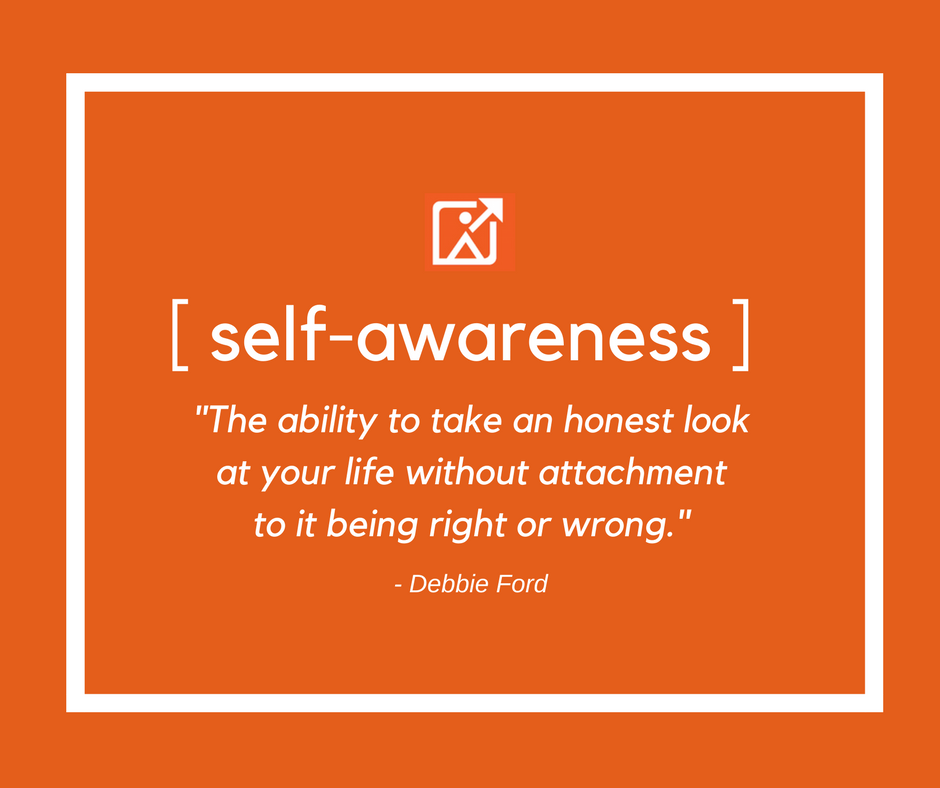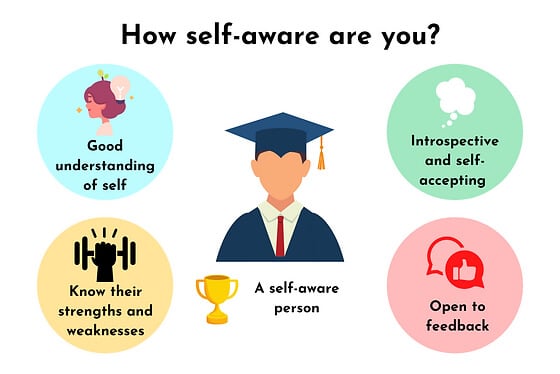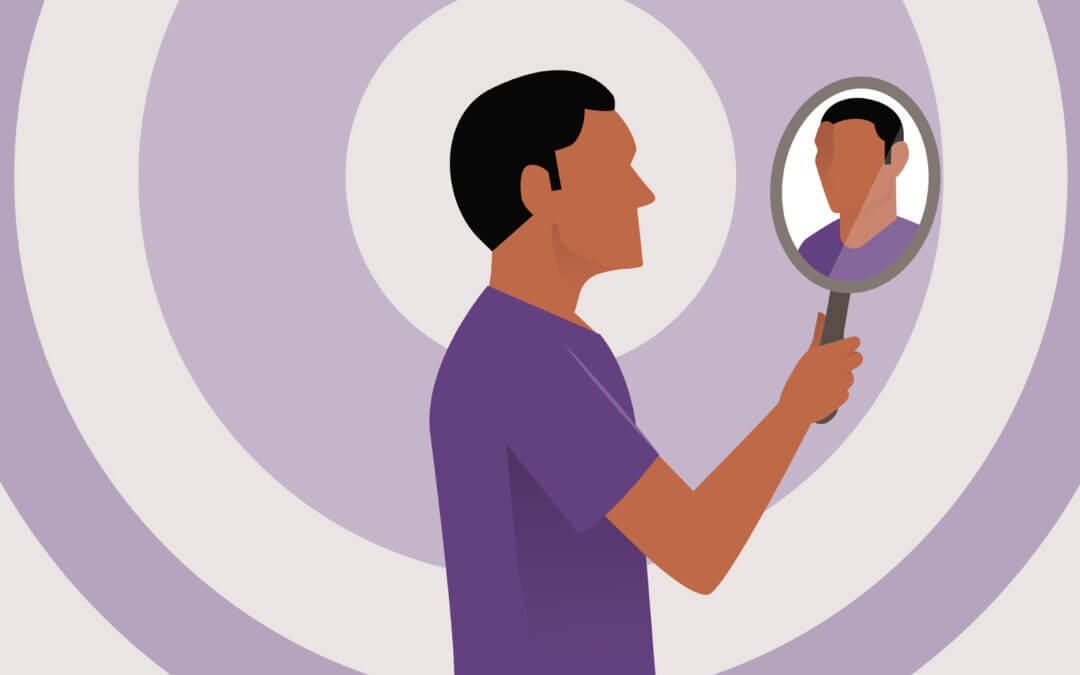The term “self-awareness” seems self-explanatory—it’s an awareness of the self. But what does that even mean? And why would so many self-help gurus need to preach about the importance of such an obvious concept?
Simple as it may be, self-awareness is something that many (if not most) of us lack. Yet, it’s the one thing that can help us achieve both self-improvement and self-acceptance.
What is Self-Awareness?
Simply put, self-awareness is the conscious knowledge of one’s own character and feelings. That sounds pretty simple. But the truth is, many of us float through our days with little awareness of what we’re doing or why we’re doing it. And that’s not necessarily a bad thing—our lives are much easier when we don’t have to think about the little things, like brushing our teeth or driving to work.
The danger arises when we stop noticing some of our more significant behaviors, like how we react to or deal with problems. Our minds are pretty good at forming blueprints of emotional responses, so it doesn’t take long before certain responses become habits. Self-awareness means being conscious of this conditioning so we can have more control over our emotional responses (especially the ones that might not be so healthy).
Self-Awareness Examples
According to author Mark Manson, self-awareness can be understood on several different levels. At the surface, it’s simply being aware of your actions. At a deeper level, it’s recognizing the problems that you create for yourself and finding strategies to fix them.
Awareness of Actions
The first level of self-awareness includes being aware of your actions, but also (and maybe more importantly) your distractions. How often do you reach for your phone, thinking you’ll just scan your newsfeed for a few minutes, but by the time you look up an hour or two has passed?
To distract ourselves from the pain or dullness of our everyday lives, we often engage in mindless entertainment or passive activities without any realization of our actions. That’s not to say that all distractions are bad—many really do make us happy and help us fill our days without going insane.
The key is to not let your distractions control you. Choosing to spend half an hour on social media is one thing—it’s another if reaching for your phone becomes an automatic response. Once you become aware of your compulsions, you’ve already won half the battle.
Awareness of Feelings
Like our actions, you’d think it would be easy to know how you’re feeling—but many of us really don’t know until we eliminate our distractions. Once you stop using your distractions as a crutch, you’ll come face to face with some feelings that you’ve probably been forcing down for a while—these could include anger, resentment, or perhaps shame.
Becoming aware of these emotions is important because it will allow you to question their root causes and perhaps find a solution. This is where practicing mindfulness can be extremely helpful. Once you’ve identified a certain feeling—whether it’s anxiety or sadness or anger—ask yourself what’s making you feel that way. Are you really snapping at your wife because she’s chewing too loudly, or is it because you’re feeling anxious about something going on at work? Once you identify an origin, make a note of it, take a deep breath, and then move on. Next time you experience that feeling, you’ll understand why and it won’t affect you as deeply.
Why is Self-Awareness Important?
It’s impossible to better yourself or improve any aspect of your life without self-awareness. Without a starting point, how can you measure how far you’ve come or how far you still need to go? Perhaps that’s why so many of us cling to those distractions that we examined earlier. If you stay too busy to acknowledge your weaknesses, then you have no reason to work toward improvement.
You can carry on and continue to ignore your deeply rooted issues, fears, and feelings, because hey, you’ve gotten this far and it’s not that terrible yet.
But becoming more self-aware can help you to proactively manage your thoughts, emotions, and behaviors, rather than allowing them to manage you.
Self-awareness is the first step to setting goals. If you’re self-aware enough to know your strengths and weaknesses, you’ll know which goals you need to set and the strategies that will help you achieve them.
Furthermore, this consciousness of your own actions and feelings will help you to better understand others and you’ll develop healthier relationships.
Self-awareness won’t fix all of your problems, but it is a big step toward improvement.

How to Become More Self-Aware
Here are a few simple things you can do to achieve greater self-awareness every day.
- Make time for yourself.
Setting aside some time for ourselves is something many of us struggle with. Life is so busy, and it seems selfish to schedule time just for us.
But if you don’t make time for yourself, you won’t be able to give your all when it comes to work or family obligations. You also won’t get to know yourself.
Try setting aside 30–60 minutes each day when you can be alone and away from any distractions (especially digital ones). Read, write, meditate—do whatever you need to get in touch with your thoughts and feelings.
- Practice mindfulness.
Mindfulness is a simple type of meditation that requires focusing on the here and now. You’ll notice that certain thoughts and feelings will arise as you try to focus only on your environment and the present moment. You shouldn’t try to block those feelings out—instead, simply take note of them.
If you get an anxious thought about an exam, tell yourself, “I’m feeling anxious about my exam tomorrow” without judging your thoughts. Then, gently pull your mind back to the present. This exercise will help you to identify your thoughts and feelings, while also teaching you how to manage them calmly.
- Keep a journal.
Writing is a great way to process thoughts and think through problems. By keeping a log of your thoughts and feelings, you’ll also be able to track your growth. Try writing a few sentences each day about how you feel in that moment. If you have feelings of fear, happiness, anxiety, or tranquility, document them. This will help you become more in tune with your thoughts, and you’ll put yourself on a path to greater self-awareness.
- Listen.
Try to be a better listener for friends, family, and colleagues. This means being fully present and paying attention to the speaker’s words, emotions, and even body language, without making judgments or drifting off into your own world. By learning to lend an ear to others, you’ll also become a better listener to your inner voice.

Self-Awareness Matters
Becoming self-aware is a starting point for self-improvement. By getting to know your strengths, weaknesses, feelings, and emotions, you can start living actively rather than passively. You’ll experience better relationships, formulate better strategies for improvement, and find greater peace with yourself. You can start practicing with mindfulness exercises, journaling, and scheduling time for yourself.

